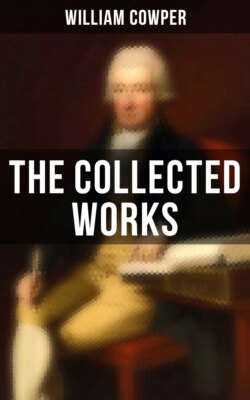Читать книгу The Collected Works - William Cowper - Страница 30
На сайте Литреса книга снята с продажи.
TO MRS. COWPER.
ОглавлениеTable of Contents
Huntingdon, April 18, 1766.
My dear Cousin—Having gone as far as I thought needful to justify the opinion of our meeting and knowing each other hereafter, I find upon reflection that I have done but half my business, and that one of the questions you proposed remains entirely unconsidered, viz. "Whether the things of our present state will not be of too low and mean a nature to engage our thoughts or make a part of our communications in heaven."
The common and ordinary occurrences of life, no doubt, and even the ties of kindred and of all temporal interests, will be entirely discarded from amongst that happy society, and, possibly, even the remembrance of them done away. But it does not therefore follow that our spiritual concerns, even in this life, will be forgotten, neither do I think, that they can ever appear trifling to us, in any the most distant period of eternity. God, as you say, in reference to the Scripture, will be all in all. But does not that expression mean that, being admitted to so near an approach to our heavenly Father and Redeemer, our whole nature, the soul, and all its faculties, will be employed in praising and adoring him? Doubtless, however, this will be the case, and if so, will it not furnish out a glorious theme of thanksgiving to recollect "the rock whence we were hewn, and the hole of the pit whence we were digged?"—to recollect the time, when our faith, which, under the tuition and nurture of the Holy Spirit, has produced such a plentiful harvest of immortal bliss, was as a grain of mustard seed, small in itself, promising but little fruit, and producing less?—to recollect the various attempts that were made upon it, by the world, the flesh, and the devil, and its various triumphs over all, by the assistance of God, through our Lord Jesus Christ! At present, whatever our convictions may be of the sinfulness and corruption of our nature, we can make but a very imperfect estimate either of our weakness or our guilt. Then, no doubt, we shall understand the full value of the wonderful salvation wrought out for us: and it seems reasonable to suppose that, in order to form a just idea of our redemption, we shall be able to form a just one of the danger we have escaped; when we know how weak and frail we were, surely we shall be more able to render due praise and honour to his strength who fought for us; when we know completely the hatefulness of sin in the sight of God, and how deeply we were tainted by it, we shall know how to value the blood by which we were cleansed as we ought. The twenty-four elders, in the fifth of the Revelations, give glory to God for their redemption out of every kindred, and tongue, and people, and nation. This surely implies a retrospect to their respective conditions upon earth, and that each remembered out of what particular kindred and nation he had been redeemed, and, if so, then surely the minutest circumstance of their redemption did not escape their memory. They who triumph over the Beast, in the fifteenth chapter, sing the song of Moses, the servant of God; and what was that song? A sublime record of Israel's deliverance and the destruction of her enemies in the Red Sea, typical, no doubt, of the song, which the redeemed in Sion shall sing to celebrate their own salvation and the defeat of their spiritual enemies. This again implies a recollection of the dangers they had before encountered, and the supplies of strength and ardour they had, in every emergency, received from the great Deliverer out of all. These quotations do not, indeed, prove that their warfare upon earth includes a part of their converse with each other; but they prove that it is a theme not unworthy to be heard, even before the throne of God, and therefore it cannot be unfit for reciprocal communication.
But you doubt whether there is any communication between the blessed at all, neither do I recollect any Scripture that proves it, or that bears any relation to the subject. But reason seems to require it so peremptorily, that a society without social intercourse seems to be a solecism and a contradiction in terms; and the inhabitants of those regions are called, you know, in Scripture, an innumerable company, and an assembly, which seems to convey the idea of society as clearly as the word itself. Human testimony weighs but little in matters of this sort, but let it have all the weight it can. I know no greater names in divinity than Watts and Doddridge: they were both of this opinion, and I send you the words of the latter.
"Our companions in glory may probably assist us by their wise and good observations, when we come to make the providence of God here upon earth, under the guidance and direction of our Lord Jesus Christ, the subject of our mutual converse."
Thus, my dear cousin, I have spread out my reasons before you for an opinion, which, whether admitted or denied, affects not the state or interest of our soul. May our Creator, Redeemer, and Sanctifier, conduct us into his own Jerusalem, where there shall be no night, neither any darkness at all, where we shall be free, even from innocent error, and perfect in the light of the knowledge of God in the face of Jesus Christ.
Yours faithfully,
W. C.
